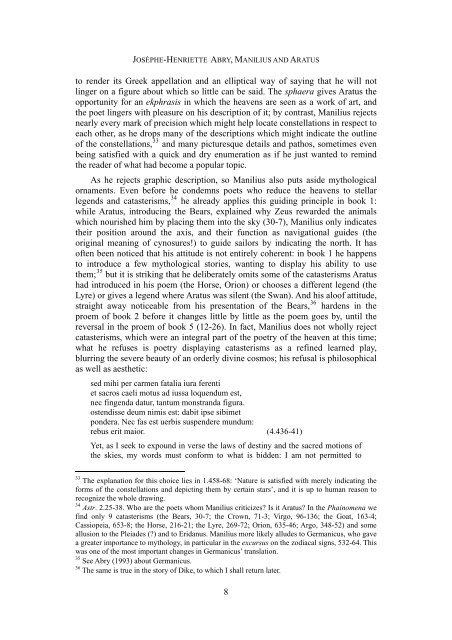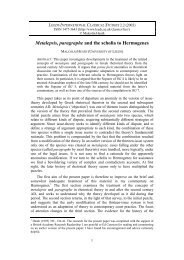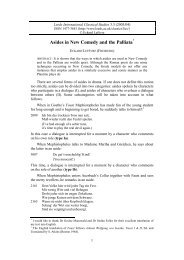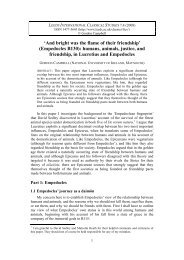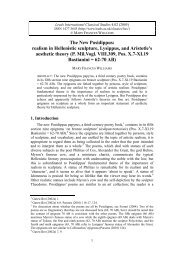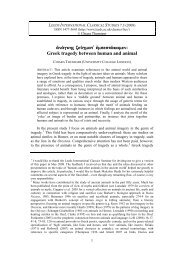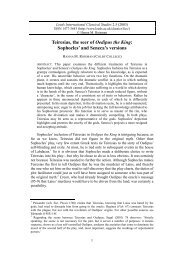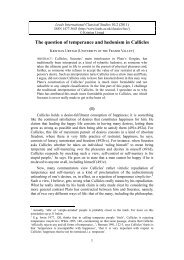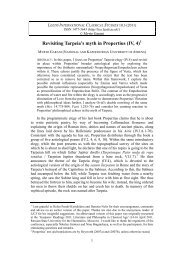Manilius and Aratus: two Stoic poets on stars - Leeds International ...
Manilius and Aratus: two Stoic poets on stars - Leeds International ...
Manilius and Aratus: two Stoic poets on stars - Leeds International ...
You also want an ePaper? Increase the reach of your titles
YUMPU automatically turns print PDFs into web optimized ePapers that Google loves.
JOSÈPHE-HENRIETTE ABRY, MANILIUS AND ARATUS<br />
to render its Greek appellati<strong>on</strong> <str<strong>on</strong>g>and</str<strong>on</strong>g> an elliptical way of saying that he will not<br />
linger <strong>on</strong> a figure about which so little can be said. The sphaera gives <str<strong>on</strong>g>Aratus</str<strong>on</strong>g> the<br />
opportunity for an ekphrasis in which the heavens are seen as a work of art, <str<strong>on</strong>g>and</str<strong>on</strong>g><br />
the poet lingers with pleasure <strong>on</strong> his descripti<strong>on</strong> of it; by c<strong>on</strong>trast, <str<strong>on</strong>g>Manilius</str<strong>on</strong>g> rejects<br />
nearly every mark of precisi<strong>on</strong> which might help locate c<strong>on</strong>stellati<strong>on</strong>s in respect to<br />
each other, as he drops many of the descripti<strong>on</strong>s which might indicate the outline<br />
of the c<strong>on</strong>stellati<strong>on</strong>s, 33 <str<strong>on</strong>g>and</str<strong>on</strong>g> many picturesque details <str<strong>on</strong>g>and</str<strong>on</strong>g> pathos, sometimes even<br />
being satisfied with a quick <str<strong>on</strong>g>and</str<strong>on</strong>g> dry enumerati<strong>on</strong> as if he just wanted to remind<br />
the reader of what had become a popular topic.<br />
As he rejects graphic descripti<strong>on</strong>, so <str<strong>on</strong>g>Manilius</str<strong>on</strong>g> also puts aside mythological<br />
ornaments. Even before he c<strong>on</strong>demns <str<strong>on</strong>g>poets</str<strong>on</strong>g> who reduce the heavens to stellar<br />
legends <str<strong>on</strong>g>and</str<strong>on</strong>g> catasterisms, 34 he already applies this guiding principle in book 1:<br />
while <str<strong>on</strong>g>Aratus</str<strong>on</strong>g>, introducing the Bears, explained why Zeus rewarded the animals<br />
which nourished him by placing them into the sky (30-7), <str<strong>on</strong>g>Manilius</str<strong>on</strong>g> <strong>on</strong>ly indicates<br />
their positi<strong>on</strong> around the axis, <str<strong>on</strong>g>and</str<strong>on</strong>g> their functi<strong>on</strong> as navigati<strong>on</strong>al guides (the<br />
original meaning of cynosures!) to guide sailors by indicating the north. It has<br />
often been noticed that his attitude is not entirely coherent: in book 1 he happens<br />
to introduce a few mythological stories, wanting to display his ability to use<br />
them; 35 but it is striking that he deliberately omits some of the catasterisms <str<strong>on</strong>g>Aratus</str<strong>on</strong>g><br />
had introduced in his poem (the Horse, Ori<strong>on</strong>) or chooses a different legend (the<br />
Lyre) or gives a legend where <str<strong>on</strong>g>Aratus</str<strong>on</strong>g> was silent (the Swan). And his aloof attitude,<br />
straight away noticeable from his presentati<strong>on</strong> of the Bears, 36 hardens in the<br />
proem of book 2 before it changes little by little as the poem goes by, until the<br />
reversal in the proem of book 5 (12-26). In fact, <str<strong>on</strong>g>Manilius</str<strong>on</strong>g> does not wholly reject<br />
catasterisms, which were an integral part of the poetry of the heaven at this time;<br />
what he refuses is poetry displaying catasterisms as a refined learned play,<br />
blurring the severe beauty of an orderly divine cosmos; his refusal is philosophical<br />
as well as aesthetic:<br />
sed mihi per carmen fatalia iura ferenti<br />
et sacros caeli motus ad iussa loquendum est,<br />
nec fingenda datur, tantum m<strong>on</strong>str<str<strong>on</strong>g>and</str<strong>on</strong>g>a figura.<br />
ostendisse deum nimis est: dabit ipse sibimet<br />
p<strong>on</strong>dera. Nec fas est uerbis suspendere mundum:<br />
rebus erit maior. (4.436-41)<br />
Yet, as I seek to expound in verse the laws of destiny <str<strong>on</strong>g>and</str<strong>on</strong>g> the sacred moti<strong>on</strong>s of<br />
the skies, my words must c<strong>on</strong>form to what is bidden: I am not permitted to<br />
33 The explanati<strong>on</strong> for this choice lies in 1.458-68: ‘Nature is satisfied with merely indicating the<br />
forms of the c<strong>on</strong>stellati<strong>on</strong>s <str<strong>on</strong>g>and</str<strong>on</strong>g> depicting them by certain <strong>stars</strong>’, <str<strong>on</strong>g>and</str<strong>on</strong>g> it is up to human reas<strong>on</strong> to<br />
recognize the whole drawing.<br />
34 Astr. 2.25-38. Who are the <str<strong>on</strong>g>poets</str<strong>on</strong>g> whom <str<strong>on</strong>g>Manilius</str<strong>on</strong>g> criticizes? Is it <str<strong>on</strong>g>Aratus</str<strong>on</strong>g>? In the Phainomena we<br />
find <strong>on</strong>ly 9 catasterisms (the Bears, 30-7; the Crown, 71-3; Virgo, 96-136; the Goat, 163-4;<br />
Cassiopeia, 653-8; the Horse, 216-21; the Lyre, 269-72; Ori<strong>on</strong>, 635-46; Argo, 348-52) <str<strong>on</strong>g>and</str<strong>on</strong>g> some<br />
allusi<strong>on</strong> to the Pleiades (?) <str<strong>on</strong>g>and</str<strong>on</strong>g> to Eridanus. <str<strong>on</strong>g>Manilius</str<strong>on</strong>g> more likely alludes to Germanicus, who gave<br />
a greater importance to mythology, in particular in the excursus <strong>on</strong> the zodiacal signs, 532-64. This<br />
was <strong>on</strong>e of the most important changes in Germanicus’ translati<strong>on</strong>.<br />
35 See Abry (1993) about Germanicus.<br />
36 The same is true in the story of Dike, to which I shall return later.<br />
8


